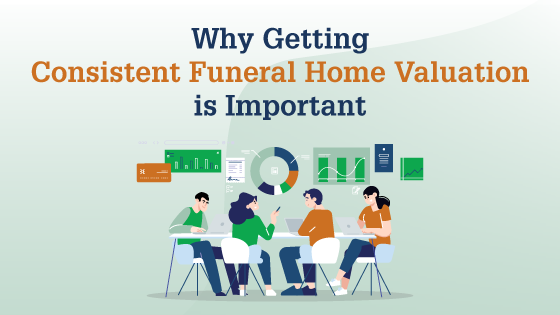Many funeral homeowners make the mistake of only conducting a valuation when they are ready to sell, estate planning, significant change in their lives/businesses, refinancing or are looking for funding. But the reality is, that you should know where your business stands consistently. It serves as a key component of strategic planning–whether you’re expanding or paying taxes, yearly budgeting, looking at staffing and more. Here are other ways a consistent funeral home valuation can benefit you.
Knowing Your Bottom Line
If your finances are currently disorganized, then a valuation will force you to get them in order. While there are several different metrics through which one can assess the value of a funeral home, most of them require your gross revenue, EBITDA, and real estate totals. It also helps with looking at industry benchmarks to see if you can bring some of your expense items more in line AND revenue. For example, does pricing need to be adjusted to be more competitive?
Inherently, conducting a valuation forces you to see exactly how profitably your business is performing. Knowing these numbers can help you make decisions about new employees, remodeling projects, and other capital improvements to your funeral home.
Goal Setting
By knowing where your funeral home stands in terms of value, you can more accurately set goals. For example, if you’re setting benchmarks for preneed sales initiatives, knowing how your funeral home performed last year can help you set realistic expectations for your team.
A valuation can also be a key component of a gap analysis, that is, the process of measuring your funeral home’s current performance and charting a trajectory to target performance. Looking at it year over year assists with planning for the next year, as well as, for the year you plan to sell. In addition to accounting for your business’s value, a gap analysis also requires you to examine your resources, people, and technology. From there, you can outline optimal performance indicators and begin developing strategies to set you on a course to achieving them.
Exit Planning
When planning your exit strategy, one of the most important considerations will be the amount of money you net from a sale. After all, the gains from selling your funeral home will likely compose a large portion of your retirement savings. Because of this, valuations will keep you informed of your alignment with post-ownership goals. It also assists with looking at the structure today (cash, CNC, seller note, etc.) to see what will be the best option for you tax-wise when the time comes.
It’s good to be knowledgeable and informed before it’s time to sell as it helps determine if there needs to be any changes to your corporate structure. If you are a C-Corp, should you convert to an S-Corp for better tax advantages if you aren’t planning to sell in 5-10 more years?
Even if you plan to pass your business to a child or other family member, you’ll still want to assess a fair value range for your business, as this can help mitigate conflict and provide a smooth transition for the new owner.
Growth Strategy
The primary benefit of a valuation is clarity. While a valuation may not always come back as high as you’d like, knowing the truth will only help you in the long run. In addition to giving you a more tangible picture of your finances, a valuation will also provide insight into your operational efficiency, employee performance, and marketplace positioning. This can provide an understanding of revenues, average sales, demographics of your market area, etc.
When a report indicates that your high rates of employee turnover are hurting the value of your business, you can begin developing strategies to attract, train, and retain stellar talent. It can also help you identify positions that might be needed. Alternatively, if your value is hampered by an underperforming preneed program, you can put in the work to build up your backlog of preneed sales.
An Accurate Valuation
The valuation of a funeral home is typically looked at based on a multiple of EBITDA which takes your EBITDA and multiplies it by a variable specific to the industry. This multiple ranges from 6 to 7 for average to larger funeral homes in today’s market.
The multiple can vary based on the size of the firm (case volume and locations) as well as pricing, demographics, historical trends and growth.. Looking at valuing your firm based on an “off the cuff” multiple of revenue or average sale will not be accurate and take into account all of the key value indicators necessary to determine a true value of your business.
At Johnson Consulting Group, our funeral home valuation process thoroughly analyzes your business, its performance, and the marketplace. Through our years of experience owning, managing, buying, and selling funeral businesses, we can help you determine and interpret your valuation and understand where you’re at in your business lifecycle.
Not only will our consultants assess the accurate value of your funeral home, but we’ll help you strategically plan for the future.
PLAN FOR THE FUTURE